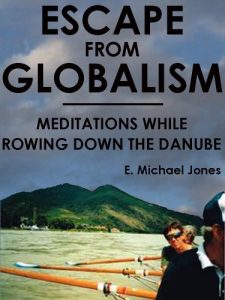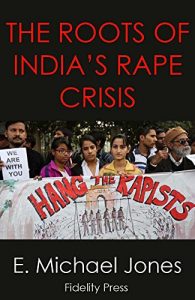Living at a time of unprecedented upheaval and social chaos, Benedict of Nursia could not save the Roman Empire from collapse, but he did something more remarkable: he created Europe to take its place. It didn't happen overnight but instead over centuries. Benedict took the best that classical culture had to offer, combined it with Christianity, and came up with a very specific way to live in a world where chaos was the rule. The Rule of St. Benedict proposed in specific terms, down to the amount of beer a monk was allowed to drink, how to live in a world where the empire had failed. Benedict's Rule became, in Dawson's words, "the Roman standard of the monastic life and finally the universal type of Western monasticism." It brought order and classical coherence to the chaotic ethnic existence of the Germanic tribes, as well as the formation of new centers of culture in Ireland, Northumbria, and ultimately the Carolingian Empire.
The Europe Benedict created is now facing another kind of threat. Europe has lost contact with its roots. The Enlightenment separates Europe's contemporary inhabitants from the man who made their culture possible. Cut off from his roots and disillusioned by one failed utopian experiment after another, European Man has contracted a spiritual disease whose clearest manifestation is his inability to reproduce. If this sickness is not cured within the the next generation, Europe will almost certainly reach the demographic tipping point and become a Muslim continent. The same is true of America. Cities like New York are fast on their way to losing their European character. And they are losing it for much the same reason: those of European descent are not having children.
Benedict's vision of the small community is now more relevant than ever. At a time of American imperial over-extension and the threat of imminent collapse, at a time when "citizen" is a euphemism for taxpayer, or cannon fodder, or both, everyone needs a supportive community. At a time of demographic collapse, young people need to know that these small communities will support them so they can marry and raise families. When they fail to receive that assurance from the Church, the young simply fail to marry and have children, creating a sense of doom based on the feeling that there is no future. And they are right. Without children there is no future. Their fears have created a self-fulfilling prophecy. Cut off from Europe's Benedictine past, the Europeans and their American cousins also find themselves cut off from the future by their fear-driven refusal to have children.
Renowned cultural critic E. Michael Jones is the editor of Culture Wars magazine and the author of The Slaughter of Cities: Urban Renewal As Ethnic Cleansing.
The Europe Benedict created is now facing another kind of threat. Europe has lost contact with its roots. The Enlightenment separates Europe's contemporary inhabitants from the man who made their culture possible. Cut off from his roots and disillusioned by one failed utopian experiment after another, European Man has contracted a spiritual disease whose clearest manifestation is his inability to reproduce. If this sickness is not cured within the the next generation, Europe will almost certainly reach the demographic tipping point and become a Muslim continent. The same is true of America. Cities like New York are fast on their way to losing their European character. And they are losing it for much the same reason: those of European descent are not having children.
Benedict's vision of the small community is now more relevant than ever. At a time of American imperial over-extension and the threat of imminent collapse, at a time when "citizen" is a euphemism for taxpayer, or cannon fodder, or both, everyone needs a supportive community. At a time of demographic collapse, young people need to know that these small communities will support them so they can marry and raise families. When they fail to receive that assurance from the Church, the young simply fail to marry and have children, creating a sense of doom based on the feeling that there is no future. And they are right. Without children there is no future. Their fears have created a self-fulfilling prophecy. Cut off from Europe's Benedictine past, the Europeans and their American cousins also find themselves cut off from the future by their fear-driven refusal to have children.
Renowned cultural critic E. Michael Jones is the editor of Culture Wars magazine and the author of The Slaughter of Cities: Urban Renewal As Ethnic Cleansing.












